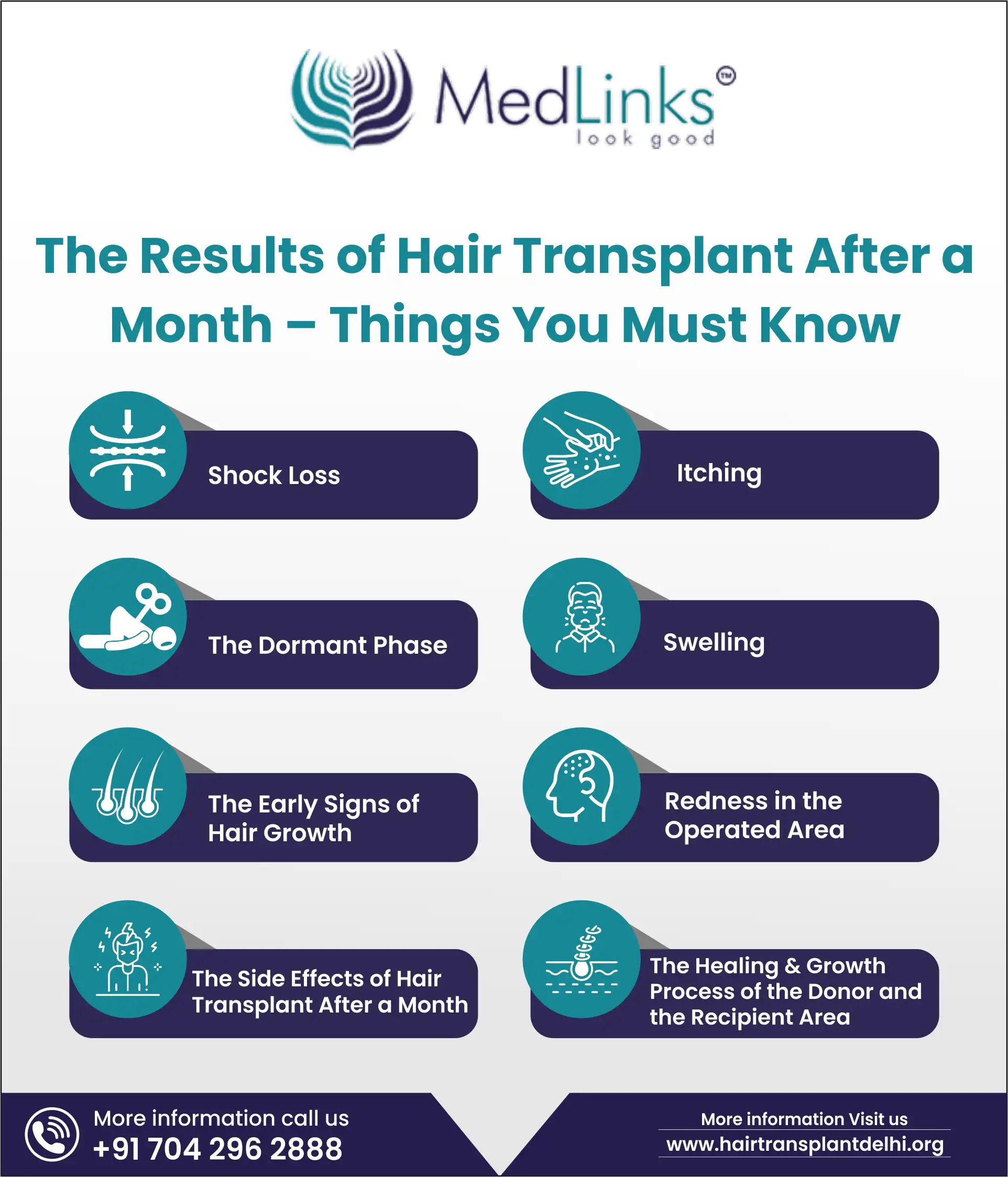- Home
- About Us
- Hair Transplant
- Hair Loss
- Medical Treatment
- Patients Gallery
- Our Patients
- Blog
- Contact Us
- Hair Transplant Cost
- Book an Appointment
- Brochure

Hair loss can have a significant impact on your self-confidence and overall well-being. In modern society, your hair is often considered an integral component of your physical identity. Losing hair in visible areas can change your appearance drastically.
If you have hair loss and want to counter the social anxiety associated with it, undergoing a hair transplant is ideal. A hair transplant procedure is one of the best ways to boost your confidence. However, you must know what to expect in the first month after a hair transplant.
The first month after a hair transplant involves some dramatic transformations in the hairline. For instance, it is pretty common to experience swelling, bleeding, etc., from the transplanted area. Following a hair transplant surgery, you must strictly adhere to the aftercare instructions.
Swelling of the forehead and eyes is pretty common two to seven days after the procedure. You can consult your surgeon if there is persistent discomfort on your scalp. Here are some essential things to learn about the results and side effects of hair transplant after a month.

Note that you cannot expect significant improvements right after the first month. Always remember that hair growth is a gradual process. Here are the outcomes of a hair transplant after a month.
Right after the hair transplant, you may experience shock loss. It is a usual outcome of the hair transplant surgery. Shock loss refers to the phenomenon when you shed the transplanted follicles. It leaves the scalp without hair for a short time.
You mustn’t be alarmed while experiencing shock loss. It is a temporary process and indicates the growth of new hair follicles in the coming months.
After the phase of shock loss, your transplanted hair follicles enter a dormant phase. It is a stage where there’s no visible hair growth. Most surgeons opine that it is the stage where the transplanted follicles adapt to the new environment.
It is the phase where your hair will grow by 1 to 2 cm. The early signs of hair growth imply that your hair transplant surgery is successful. With the progression of the growth cycle, hair will become denser and more substantial. However, the hair growth rate may vary from one individual to another.
Typically, modern-day hair transplant procedures are safe. However, you must know about the potential side effects associated with hair transplant within the first month after surgery. Listed are the side effects associated with a hair transplant procedure.
After a hair transplant, you may experience persistent itching in the donor and recipient areas. Note that this sensation is temporary. You can manage it with proper guidance from your surgeon. However, you must not scratch or rub the donor and recipient areas.
It is a normal occurrence after a hair transplant surgery. It becomes pretty prominent in the forehead and the areas where your transplant was performed. The key to minimise swelling is to follow the instructions of your surgeon. With proper post-operative care, it can subside within a few days.
Redness in the transplanted area is a common side effect of the hair transplant procedure. But there is nothing to be afraid of. The redness typically fades over time with proper care. If it persists for more than 1.5 months, consult your surgeon.
Within a month after a hair transplant surgery, the donor and recipient area may experience several changes. The donor area should be healing after a month of hair transplant. Furthermore, any visible scars or incisions in this area must diminish by a month. You may experience mild redness in the donor area.
The transplanted area may experience the shedding phase, as stated above. At the one-month mark, you may observe early signs of hair growth in the area.
Note that hair growth after surgery is a gradual process. The results and side effects of hair transplants typically vary from one individual to another.
The primary benefit of undergoing this hair transplant surgery is the instant implantation of extracted follicles. Moreover, in this procedure, the surgeon uses the “feather touch” graft implantation technique.
Your body secretes fibrin which fortifies the hair grafts and makes them stay intact. Note that after two weeks, the grafts will be secure in the transplanted area.
Under no condition, can you scratch the transplanted area of your head. It might cause severe complications. Moreover, there are higher chances of the scalp becoming infected by scratching.
You should be extremely careful with the transplanted hair after a month of hair transplant. Your surgeon will recommend you to avoid strenuous exercises and stick to a balanced diet.

Dr. Gaurang Krishna

Copyright © 2025 Medlinks. All Rights Reserved.
Disclaimer:The content published on this website(hairtransplantdelhi.org) is meant to spread awareness and educate the concerned patients regarding baldness and hair transplants as well as the treatment options available for baldness and hair transplant treatment in Delhi India. Any information on the website shall not be regarded as a prescription from a professional dermatologist. We recommend visiting a dermatologist in person for the right diagnosis and the treatment for any hair issues. We do not guarantee specific results as the treatments and the results vary from person to person.